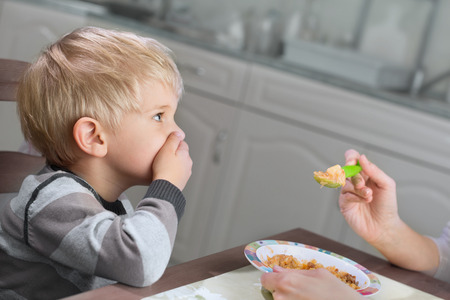Health is not just physical fitness. It is also social and mental well-being. So, to raise healthy eaters – who have a good relationship with food – parents need to focus not only on what they feed children (i.e., nutrients and vitamins) but also on how they feed children (i.e., their child-feeding behaviours). After all, when parents use inappropriate child-feeding actions, they can inadvertently cause stress, guilt and anxiety around mealtimes, which is associated with disordered eating and even childhood obesity. To raise healthy and competent eaters, here are some simple dos and don’ts.

Do: Eat meals as a family
The act of eating together is key to social relationships and well-being. When families eat while seated at the same table, parents may act as role models for children. Adults can demonstrate desired mealtime behaviours (e.g., remaining seated for the full duration of the meal, and using utensils). Another benefit to eating as a family is that it enables more communication between adults and children. Conversation about food allows children to develop a greater appreciation of diverse food flavours and textures. Asking children questions about the five tastes (i.e., sweet, salty, sour, bitter, and umami) and their experience of the five senses (e.g., “I wonder what sound celery makes when you bite into it?”) can deepen their enjoyment of food.
Do: Involve children in meal preparation

Involve children in meal planning, growing and cooking food, setting the table, and decorating the dining space. These actions support children’s curiosity about food and intrinsic motivation to eat. Also, when children cook and grow fresh fruits and vegetables, they are more likely to enjoy – and consume – fresh produce.
Do: Empower children to decide how much they eat
Children are born able to self-regulate their food intake. However, when parents hide food, use sweets as bribes, and monitor children’s portion sizes in overly controlling ways, they can hinder children’s development of this self-awareness.

By trusting children to decide how much they consume, parents can support children’s sensitivity to bodily sensations like hunger and fullness. Instead of saying, “Finish everything on your plate” at mealtimes, adults can support children’s self-regulation skills by asking questions like “How do you feel? Are you full?” This can help children to self-assess their satiety levels.
Self-regulation skills are important to children, and will support their health into later childhood and adulthood. Parents will not always be around to ensure that children eat balanced meals. A healthy eater is one who eats well, intuitively.
Do: Collaborate with other caregivers
As the saying goes, “It takes a village to raise a child”. It takes a village to feed one too. Discuss your child-feeding approach with teachers, grandparents and domestic helpers to make sure that all adults in your child’s life are on the same page when it comes to mealtimes. Preschool teachers have special insight into children’s eating habits when they are away from home. Grandparents and domestic helpers are also key caregivers who make significant child-feeding decisions. They should not be overlooked. Open dialogue about what, where and when children eat can ensure consistency in mealtime facilitation.
Do: Ensure a pleasant dining environment
Take care to arrange the dining space so that it is clean, calm and free of distractions. When children are distracted by watching videos at mealtimes, their consumption of sugar-sweetened drinks and energy dense foods increases. Conversely, soothing, unrushed meals in pleasant spaces enable children to eat a more balanced diet mindfully. They are instrumental in supporting children’s all-round health.
Do: Extend your knowledge
Check out the research on child-feeding best practices. Dietitian Ellyn Satter’s Division of Responsibility in Feeding framework is particularly helpful. The model makes deciding what to do at mealtimes simple. Essentially, it states that the parents and children have separate and distinct roles when it comes to meals. The adult is responsible for what is served, when it is eaten, and where meals happen. And the child is responsible for how much and whether they eat.
Articles in parenting magazines also offer sound advice on feeding young children. There are courses that help parents facilitate healthful food experiences with children too. For instance, the Singapore University of Social Sciences offers the module, Introduction to Edible Education for Children.
Don’t: Pressure children to eat
Most parents know it is not ideal to force feed children. But pressure is about more than just pushing food directly into children’s mouths. Pressure can come from offering children the same food over and over again at one sitting. It can also come from threats (e.g., “If you don’t eat, you cannot watch your favourite show on the iPad later”), and bribes (e.g., “If you eat these vegetables, I will give you this chocolate”). Such tactics often backfire because young children need to feel a sense of autonomy. So, parental pushiness just leads to more resistance to food. It also makes it seem like energy dense foods like chocolate are more scarce and desirable than vegetables. This could make children fixate on sweet foods and want them even more.
Don’t: Shame your children into eating

Adults may employ feelings of shame and disgust in their efforts to encourage children to moderate their food intake (e.g., “You are so thin, the wind can blow you away. Eat more!” or “You’re so fat already—better not eat that!”). Shame-based feeding strategies elicit feelings of inadequacy and guilt in children. They can affect children’s mental health. This is a great concern because eating disorders can affect children as young as 6 years old.
Don’t: Feed girls and boys differently
Parents tend to be more controlling of young girls’ food intake compared with boys. This is likely due to the greater cultural and societal expectation for girls to be slim. This is worrying because when girls notice parents putting tight constraints over what foods they eat, they are more likely to engage in emotional eating, eat in the absence of hunger, and overconsume snacks when given the opportunity. This can harm their health in the long run. It is vital to treat boys and girls in an equitable manner at mealtimes.
Armed with these tips, I hope parents will feel empowered to nurture healthy and happy eaters. Food can be one of life’s greatest pleasures. When parents use sound child-feeding strategies, they can raise children with well-balanced eating habits, which last a lifetime.
By Chin Hui Wen.
* * * * *
Like what you see here? Get parenting tips and stories straight to your inbox! Join our mailing list here.
Want to be heard 👂 and seen 👀 by over 100,000 parents in Singapore? We can help! Leave your contact here and we’ll be in touch.

























































Leave a Comment: